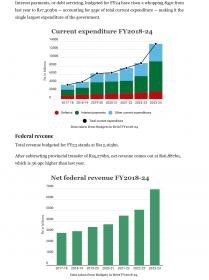- Joined
- Oct 2, 2004
- Runs
- 218,154
The federal government is expected to present a budget of Rs12.994 trillion for the next fiscal year 2022-23 on June 10 in the National Assembly.
There is a proposal to impose additional taxes worth Rs1.155 trillion in next budget while the revenue target is likely to be set at Rs7.25 trillion, which includes the collection of Rs843 billion in terms of customs duty.
The volume of the federal development budget is likely to be set at Rs700 billion and a sum of Rs1.58 trillion is expected to be allocated for defence.
A meeting of the Annual Plan Coordination Committee (APC) has been convened on June 4 to set important targets, including economic growth.
According to sources in the finance ministry, the meeting is likely to approve the GDP growth target for the next financial year.
The targets for inflation, exports, imports, remittances will also be set in the same meeting.
In addition, targets for agriculture, industry and services sector, investment and national savings will also be set in APC meeting.
The sources added that after that, the National Economic Council (NEC) would meet to discuss the annual uplift schemes and approve the Public Sector Development Programme (PSDP).
During the next financial year, it is estimated to pay Rs3.52 trillion in terms of loans and interest payments on them.
The sources said the preparations for the next budget have entered their final stage. They added that the budget formulation proposals were being finalised.
In February this year, the PTI-led government had confirmed that the federal budget deficit in the first half of current fiscal year shot up to Rs1.85 trillion, up by 33% in comparison with the same period of the previous year.
The deficit mainly widened because of higher expenditures as the revenue remained better than the budgetary estimates, showed the fiscal operations summary for July-December of current fiscal year.
During the first half of previous fiscal year, the federal budget deficit had been slightly lower than Rs1.4 trillion.
The annual federal budget deficit target was Rs4 trillion for the current fiscal year.
The PTI-led government had taken a net Rs1.02 trillion in foreign loans to finance the federal deficit.
External financing for bridging the deficit was 126% more than the previous year, underscoring the country’s increasing reliance on foreign players to meet its expenditure needs.
Another Rs826 billion was borrowed from domestic sources to bridge the budget gap.
A major reason behind the surge in deficit was the uptick in current expenditures, as the government spent a lower amount under the PSDP to meet a condition of the International Monetary Fund (IMF).
Current expenditures were equal to 92% of the total federal government expenditures and over 38% of them were spent only on paying interest on loans.
https://tribune.com.pk/story/2358928/rs13tr-budget-for-next-fy-set-to-be-proposed
There is a proposal to impose additional taxes worth Rs1.155 trillion in next budget while the revenue target is likely to be set at Rs7.25 trillion, which includes the collection of Rs843 billion in terms of customs duty.
The volume of the federal development budget is likely to be set at Rs700 billion and a sum of Rs1.58 trillion is expected to be allocated for defence.
A meeting of the Annual Plan Coordination Committee (APC) has been convened on June 4 to set important targets, including economic growth.
According to sources in the finance ministry, the meeting is likely to approve the GDP growth target for the next financial year.
The targets for inflation, exports, imports, remittances will also be set in the same meeting.
In addition, targets for agriculture, industry and services sector, investment and national savings will also be set in APC meeting.
The sources added that after that, the National Economic Council (NEC) would meet to discuss the annual uplift schemes and approve the Public Sector Development Programme (PSDP).
During the next financial year, it is estimated to pay Rs3.52 trillion in terms of loans and interest payments on them.
The sources said the preparations for the next budget have entered their final stage. They added that the budget formulation proposals were being finalised.
In February this year, the PTI-led government had confirmed that the federal budget deficit in the first half of current fiscal year shot up to Rs1.85 trillion, up by 33% in comparison with the same period of the previous year.
The deficit mainly widened because of higher expenditures as the revenue remained better than the budgetary estimates, showed the fiscal operations summary for July-December of current fiscal year.
During the first half of previous fiscal year, the federal budget deficit had been slightly lower than Rs1.4 trillion.
The annual federal budget deficit target was Rs4 trillion for the current fiscal year.
The PTI-led government had taken a net Rs1.02 trillion in foreign loans to finance the federal deficit.
External financing for bridging the deficit was 126% more than the previous year, underscoring the country’s increasing reliance on foreign players to meet its expenditure needs.
Another Rs826 billion was borrowed from domestic sources to bridge the budget gap.
A major reason behind the surge in deficit was the uptick in current expenditures, as the government spent a lower amount under the PSDP to meet a condition of the International Monetary Fund (IMF).
Current expenditures were equal to 92% of the total federal government expenditures and over 38% of them were spent only on paying interest on loans.
https://tribune.com.pk/story/2358928/rs13tr-budget-for-next-fy-set-to-be-proposed







